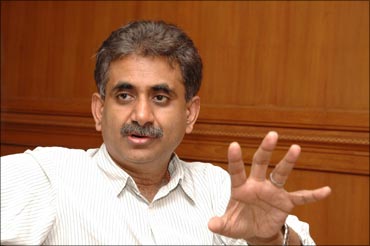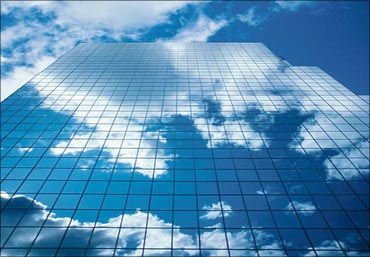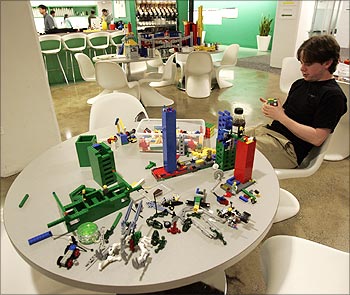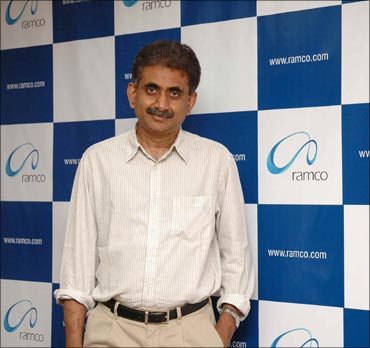Photographs: Sreeram Selvaraj Shobha Warrier
When most software companies in India stuck to services, Ramco Systems founded by P R Venketrama Raja in 1992 decided to create products by concentrating on research and development.
Today, it has become one of the top 100 enterprise solution providers in the world with its products. The company has 15 offices spread across nine countries.
The global income of the company for the financial year 2010-2011 is $47.41 million. The revenue break-up is, India -- 36%, the United States -- 23%, MENA (Middle East and North Africa) -- 18%, Europe -- 3%, APac -- 6%, South Africa -- 14%.
Ramco has 11 industry solutions and serves customers across 60 verticals. It has over 125,000 users from 800+ customer organisations and 3,000+ users on the Cloud.
The industry solutions are manufacturing, real estate & construction, energy & utilities, logistics, mining & cement, facilities management, banking & financial services, aviation, government, defense, etc.
In this interview, Venketrama Raja talks about the company, industry and cloud computing.
. . .
'Cloud computing can change IT sector's economics'
Photographs: Reuters
Did you always want to be an entrepreneur?
Yes. That is because I belong to a family of entrepreneurs. We are into cement, chemicals, textiles, building products, etc.
But my grandfather was an agriculturist who later started our first industry; a cotton yarn factory. This year, we are celebrating the 75th anniversary of our first industry.
So my aim had always been to create an enterprise that can grow. There are two kinds of entrepreneurs; one who want to make money and another one who want to build institutions -- like the Tatas, for example.
We always wanted to build institutions and run them excellently.
My dream, coming back after doing my Masters in the US, was to create something international. That is why I decided to concentrate on R&D. What I learnt there in the US was that you have to have a solid understanding of what you wanted to do.
. . .
'Cloud computing can change IT sector's economics'
America is a land of entrepreneurs. How much did your studies there help you think differently?
I had a general idea about what I wanted to do but my studies there helped me refine my ideas. We had some excellent professors like C K Prahlad, Bradley, et cetera and they helped me refine my thinking. I felt I should start an R&D-centric institution.
When you started Ramco Systems in 1992, software product development was not that popular in India. Why did you choose R&D and not services?
In 1992, when I started Ramco Systems as a part of Ramco Industries with a capital of Rs 3 crore (Rs 30 million), services was slowly getting popular in India.
R&D was unheard of. Maybe because we are from an industrial manufacturing background that I preferred R&D to services.
As an industrial house, we have only created products.
. . .
'Cloud computing can change IT sector's economics'
You are a chemical engineer. Why did you choose software as your field and not textiles or chemicals?
I knew the future lay in software. We also wanted to work in networking rather than mainframes. That was when PCs started coming in.
By 1996, we knew we had to create something for the new market. We were in heavy R&D work in the next 6-7 years.
Were you not tempted to be in services?
In services, I felt you would be just another company. But as a product development company, we could create unique products.
Yes, R&D was not in the culture of India. So, it was a big challenge and I enjoyed doing it. We have now released products that are world beaters.
How was the first year of operation?
It was tough. Soon, we decided to concentrate on ERP and it takes years of R&D with thousands of people to develop ERP products.
In the early years, you just scramble to satisfy each customer. We started with one customer and now we have 500 customers. Our 60 big and small aviation customers are our mission critical customers.
. . .
'Cloud computing can change IT sector's economics'
How was the quality of software developers at that time?
Everything had to be taught. They were used to working as if it were a project but you have to think differently for a product.
What are the changes you foresee in the software industry?
Now the world is moving towards new computing, where you can dramatically cut costs. Today, if you want to start a company, you have to buy computers and software, hire people to run your computer systems, and year after year, you have to upgrade and maintain your system.
All this is becoming expensive worldwide. Technology is changing rapidly. So what is happening is everything is getting centralised; what you call the Cloud.
So, if you can do it, you create a powerful product and install it in one place from where hundreds of people can use it.
Yes, the product has to be extremely flexible, very robust, very easy to use and so implemented that anybody can use it with one tenth of the expense.
If you can make such a product and make it available on the Cloud, it will be very attractive to users. It can change the economics of the industry. This is Cloud ERP.
That is the kind of product we have put on the Internet now. It is the culmination of years of our work. I am proud to say we have some of the most powerful sets of products for the cloud.
. . .
'Cloud computing can change IT sector's economics'
When did you start thinking about Cloud Computing?
About 4-5 years ago. We knew the trend was coming but the terminology had not come in then.
The word has to spread about this. Companies cannot think conventionally as cloud computing allows them to run without worrying about software and how to run software.
How was the response when you first started selling products made in India?
It was always tough. In the early years, our products were very good but we couldn't sell many as we were an unknown Indian company.
We had to compete with the software of companies from USA and Europe in the same board room of various US companies.
It takes many years to get the confidence of customers in the case of customised products.
Was there a bias against Indian companies?
I don't agree that there was a bias against Indian companies; it is only an attitude against unknown companies.
Moreover, Indian companies were associated with services and not product development while people in the west are keen on design and product architecture.
. . .
'Cloud computing can change IT sector's economics'
Photographs: Reuters
Do you think it would have made a difference if you were a US-based company?
If we had been a company in the US, the time taken might have got reduced by a third.
In which direction do you see product development going in the next few years?
It all depends on the area. In the case of ERP, it has to become far more flexible, far easier to use, etc. That is the direction of the movement.
More and more companies will start using Cloud ERP. A lot of new things will emerge from Cloud Computing, and new levels of opportunities will come up.
Which countries, according to you will dominate in future?
It is not about any countries dominating; it will become more and more a level playing field from the management and information processes point of view. It is going to level the operational advantage in the next 10-15 years. Then, it is all going to be design, architecture, strategy, and user experience.
What about the dominance of the US and Europe?
The dominance of the US and Europe will still continue as they are far more advanced than us in design and R&D.
Unless you get that maturity, you will not dominate over them. After all, they have invested centuries of effort on design and R&D.








article